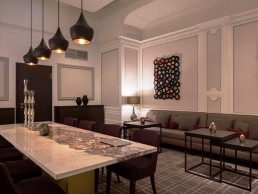European debut of Hilton’s Curio
The extensive renovation of the Reichshof Hamburg by JOI-Design not only reinstates the grandeur of this landmark; it also launches the European debut of Curio – A Collection by Hilton.
The building’s original Empire and Art Deco aesthetics have been combined with modern comforts and local cultural references, which conforms to the Curio brand’s concept of creating uniquely storied hotels that provide travellers with a cultural experience of the local community.
Located in the heart of Hamburg, opposite the central train station, the hotel first opened in 1910. Its design was inspired by the city’s maritime history and reputation as a hanseatic mercantile centre, and it wasn’t until the 1920s that the Art Deco façade was added.
Founder Anton Emil Langer wanted to reveal “the world of travel” to the local people and therefore, the original cosmopolitan concept of the hotel was envisioned. However, JOI-Design has inverted this notion by transforming the Reichshof into a journey through Hamburg’s heritage.
The initial vision of founder Herr Langer to create a design inspired by the SS Cap Polonio, a luxury transatlantic cruise-ship built in Hamburg, is still intact with original features such as the satin timber panelling and marble, copper and gold columns being restored. New furniture and fittings designed by JOI-Design complement these preserved interiors, for example the Bianca Carrara dining tables, soft velvet and leather seating, dark timber flooring, and custom-made lamps created to match those existing.
A collection of vintage black and white photographs, artwork and adverts adorn the walls, including a sepia-toned photograph of the hotel lobby as it looked in its early days, to emphasise the historical aspects of the building. The original Art Deco details have been preserved whilst the infrastructure has been discreetly modernized to international technological standards.
The lobby of The Reichshof is the largest and longest in Hamburg, plus with the demolition of the mezzanine level, has one of the tallest ceilings. The result is a space which is much more open and grand. The reception desk has been relocated to the far end of the lobby and a lounge area created to attract passers-by into the hotel.
The hotel features a daytime bar that also doubles as a sushi bar and bistro, Bar 1910, the Vinyl Lounge and Slowman restaurant. The hotel’s long-held reputation for serving the city’s best tea and coffee will be upheld with a modern take on a classic high tea being served in the afternoons from the daytime bar.
The Vinyl Lounge is exclusive to hotel residents, designed with shades of grey and purple to create a relaxing atmosphere. Whilst the restaurant, Slowman, creates a sense of exclusivity with its lack of street entrance and is part of the stable backed by Michelin-starred chef-turned-restaurateur Christian Rach.
The hotel offers 278 guestrooms, reduced from 300 in order to create a more spacious feel, as well as six junior suites and three one bedroom suites, all with discreet references to the Art Deco era.
The hotel is within walking distance of Alster Lake, the city hall, shops, restaurants, museums and galleries. It also offers a spa with a broad range of treatments including a sauna and steam bath, as well as a fitness area. Complementary WiFi is provided throughout the hotel including the flexible meeting space available for meetings and social events.
Related Posts
30 November 2015
European Hotel Design Awards 2015
13 October 2015
Hilton’s Curio set to debut in the UAE
21 January 2015




